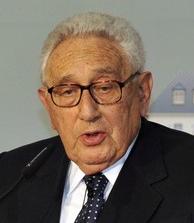| Tweet |

http://ameblo.jp/warm-heart/entry-10125231806.html から転載。 2008-08-09 05:49:26 変わる世界/米の論調/米元国務長官・外交専門家 ヘンリー・キッシンジャー氏の論評から/ブッシュ政権に警鐘 ニクソン、フォード両政権で国務長官を務めた外交専門家ヘンリー・キッシンジャー氏は、米ソ対決時代の限定核戦争論や敵対勢力の「各個撃破戦略」など、米国の帝国主義政策の立案と実行の中枢を担いました。とくに一九七〇年代、ベトナム侵略戦争の失敗で揺らいだ米政権の威信回復に奔走。政権を離れたのちも米外交のご意見番的存在として影響を及ぼしています。 そのキッシンジャー氏は最近、世界の政治経済秩序が大きな構造変化に直面し、米国がかつてないスケールで国際関係と外交政策の改編に迫られていると強調し、「単独行動主義の幻想」に酔いしれたブッシュ政権に警鐘を鳴らしています。 3つの革命 国際英字紙インターナショナル・ヘラルド・トリビューン(四月七日付)に掲載された「われわれに必要な議論」と題する論評で、「次期米政権が直面するもっとも重要な課題」は「世界で生じている三つの同時革命から、いかに新たな国際秩序をつくり出すかだ」と主張しています。 同氏のいう「三つの同時革命」とは、①欧州の旧来の国家システムの変容②歴史的な国家主権概念にたいするイスラム主義からの根源的挑戦③国際関係の重心の大西洋から太平洋・インド洋への漂流―です。 第一の変容は欧州連合(EU)の出現です。同氏は、二つの大戦を経た欧州諸国が連合をつくる過程で、国家の性質が次第に変化しつつあると説明。特に各国が主権の一部をEUに譲渡したことによって「欧州のほとんどの政府は自国民に犠牲を求める能力を劇的に縮小させた」と指摘します。 旧来型国家 一方の米国は「国民が国益のための犠牲に応じる」ような「旧来型」の国家を維持しており、このことがアフガニスタンへの軍事作戦でも、米軍とその他の北大西洋条約機構(NATO)軍の間に不協和音が生じたと分析。今後の米欧間の同盟関係の変容の必要性を指摘しています。 同氏が指摘する第二の革命は、国家という枠組みと対立しながら、それを超えて、イスラム原理主義という大枠に従って「市民社会」が形成され、拡大していること。同氏は、こうした潮流とたたかうためにイラクなどからの米軍撤退はありえないと主張しています。 第三は、、国際関係の重心が、これまでの大西洋から太平洋、インド洋に移行したことです。とくに中国、インド、日本、インドネシアの台頭を指摘。こうした勢力構造の移行はかつてはドイツの場合のように戦争をともなったものの、今日では中国を含めた競争関係が戦争になるとの見通しは少ないとのべています。 同氏は、こうした「革命」が進行しているなかで、「米国は、自らと国際社会のために、いかなる現実的目標を設定することができるか」と問いかけ、変化する国際秩序のなかで米国のリーダーシップをどう維持するかという問題意識を鮮明にしています。 (顔写真はロイターから) ---------------------------------- 国際英字紙インターナショナル・ヘラルド・トリビューンの該当英文記事はこちら ⇒ http://www.iht.com/articles/2008/04/07/opinion/edkiss.php NATIONAL SECURITY The long-predicted American debate about national security policy has yet to occur. Essentially tactical issues have overwhelmed the most important challenge a new administration will confront: how to distill a new international order from three simultaneous revolutions occurring around the globe. These are a) the transformation of the traditional state system of Europe; b) the radical Islamist challenge to historic notions of sovereignty; and c) the drift of the center of gravity of international affairs from the Atlantic to the Pacific and Indian Oceans. Conventional wisdom holds that disenchantment with President George W. Bush's alleged unilateralism is at the heart of European-American disagreements. But it will become apparent soon after the change of administrations that the principal difference between the two sides of the Atlantic is that America is still a traditional nation-state whose people respond to calls for sacrifices on behalf of a much wider definition of the national interest than Europe's. The nations of Europe, having been drained by two World Wars, have agreed to transfer significant aspects of their sovereignties to the European Union. Political loyalties associated with the nation-state have proved not to be automatically transferable, however. Europe is in a transition between its past, which it is seeking to overcome, and a future that it has not yet reached. In the process, the nature of the European state has been transformed. With the nation no longer defining itself by a distinct future and with the cohesion of the European Union as yet untested, the capacity of most European governments to ask their people for sacrifices has diminished dramatically. The disagreement over the use of NATO forces in Afghanistan is a case in point. In the aftermath of Sept. 11, the North Atlantic Council, acting without any request by the United States, invoked Article 5 of the NATO Treaty calling for mutual assistance. But when NATO set about to assume military responsibilities, domestic constraints obliged many allies to limit the number of troops and to constrict the missions for which lives could be risked. As a result, the Atlantic Alliance is in the process of evolving a two-tiered system - an alliance à la carte whose capability for common action does not match its general obligations. Over time, one of two adaptations must take place: either a redefinition of the general obligations or a formal elaboration of a two-tiered system in which political obligations and military capabilities are harmonized. This might be accomplished by assigning out-of-area projects to a European reaction force, which would then create an ad hoc alliance of the willing. While the traditional role of the state in Europe is diminished by the choice of its governments, the declining role of the state in the Middle East is inherent in the way they were founded. The successor states of the Ottoman Empire were established by the victorious powers at the end of the First World War. Unlike the European states, their borders did not reflect ethnic principles or linguistic distinctiveness but the balances achieved by the European powers in their contests outside the region. Today it is radical Islam that threatens the already brittle state structure via a fundamentalist interpretation of the Koran as the basis of a universal political organization. Radical Islam rejects claims to national sovereignty based on secular state models, and its reach extends to wherever significant populations profess the Muslim faith. Since neither the international system nor the internal structure of existing states has legitimacy in Islamist eyes, its ideology leaves little room for Western notions of negotiation or of equilibrium in a region of vital interest to the security and well-being of the industrial states. That struggle is endemic; we do not have the option of withdrawal from it. We can retreat from any one place like Iraq but only to be obliged to resist from new positions, probably more disadvantageously. Even advocates of unilateral withdrawal speak of retaining residual forces to prevent a resurgence of Al Qaeda or radicalism. These transformations take place against the backdrop of a third trend, a shift in the center of gravity of international affairs from the Atlantic to the Pacific and Indian Oceans. Paradoxically, this redistribution of power is to a part of the world where the nation still possesses the characteristics of traditional European states. The major states of Asia - China, Japan, India and, in time, possibly Indonesia - view each other the way participants in the European balance of power did, as inherent competitors even when they occasionally participate in cooperative ventures. ============================================= 【関連エントリー】 変わる世界/米の論調/ニューズウィーク・国際版編集長ザカリア氏/「アメリカ後」は平和と繁栄
gataro-cloneの投稿
変わる世界/米の論調/ヘンリー・キッシンジャー米元国務長官/ブッシュ政権に警鐘【しんぶん赤旗】
テーマ:世界の動き
以下はG-Search検索の「しんぶん赤旗記事情報」から転載。
2008.08.04 日刊紙 6頁 国際 (1,161字)
しんぶん赤旗
The debate we need to have
By Henry A. Kissinger Published: April 7, 2008
|
|
- あまりに「新世界秩序」が知れ渡ってしまったものだから 千早@オーストラリア 2008/8/09 23:55:57
(0)
|
|
投稿コメント全ログ コメント即時配信 スレ建て依頼 削除コメント確認方法
|
|
 題名には必ず「阿修羅さんへ」と記述してください。
題名には必ず「阿修羅さんへ」と記述してください。
掲示板,MLを含むこのサイトすべての
一切の引用、転載、リンクを許可いたします。確認メールは不要です。
引用元リンクを表示してください。
|
|
|
|
|
|
|
|